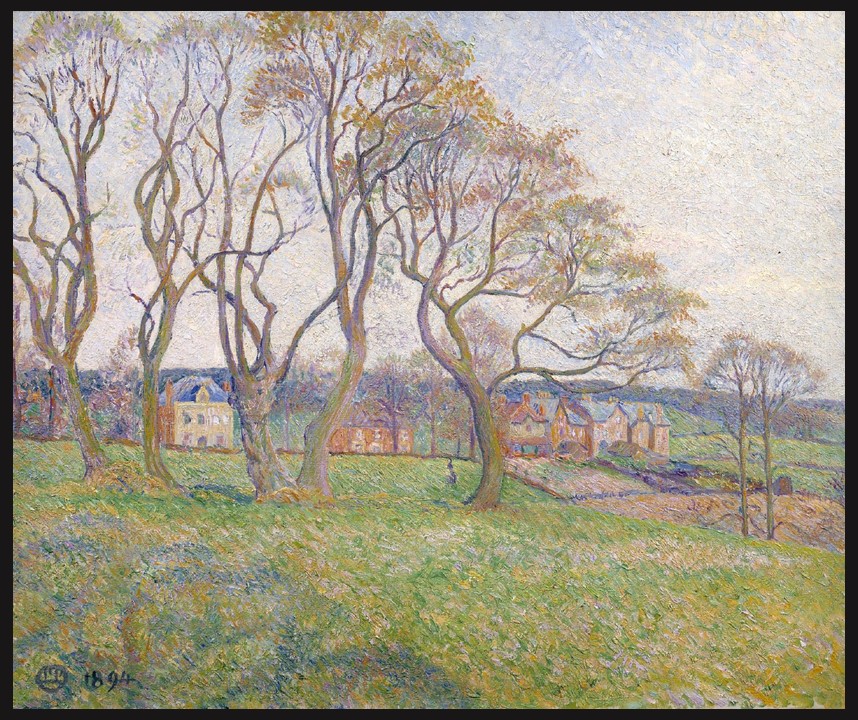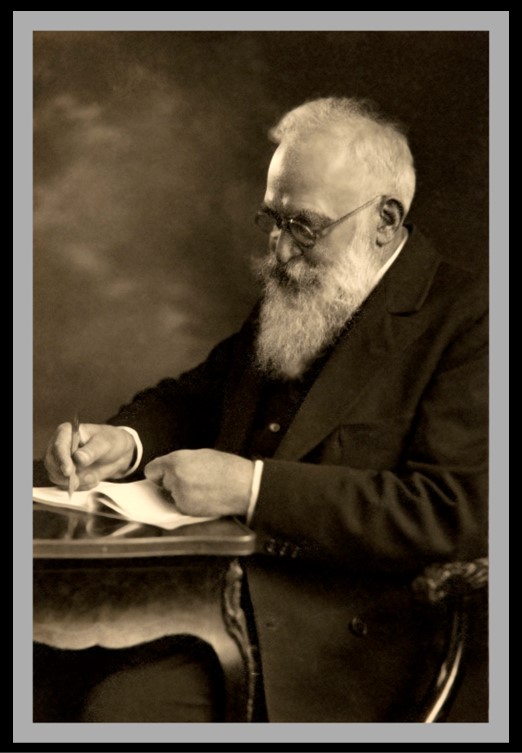
April, Epping, 1894, Oil paint on canvas, 603 × 730 mm, Tate, London, UK
https://www.tate.org.uk/art/research-publications/camden-town-group/lucien-pissarro-april-epping-r1139298
Oh, to be in England / Now that April’s there, / And whoever wakes in England / Sees, some morning, unaware, / That the lowest boughs and the brushwood sheaf / Round the elm-tree bole are in tiny leaf, / While the chaffinch sings on the orchard bough / In England—now! Robert Browning probably wrote Home-Thoughts, from Abroad in 1845, while he was staying in Italy, homesick of the English countryside during a glorious April morning! Interestingly, April by Lucien Pissarro is an Impressionistic painting of a similar April morning by a French artist living in England! https://www.poetryfoundation.org/poems/43758/home-thoughts-from-abroad
Lucien Pissarro was a French painter, printmaker, and etcher. He was born on February 20, 1863, in Paris, France, and was the oldest son of the Impressionist painter Camille Pissarro. He began his artistic education at a young age, studying under his father and at the École des Beaux-Arts in Paris. In 1884, he began exhibiting his work in Impressionist exhibitions, and in 1886, he participated in the 8th and final Impressionist exhibition. In 1888, Pissarro moved to London, where he became a member of the New English Art Club and began to develop his own unique style, influenced by the work of the Pre-Raphaelites and Japanese prints. He spent the next two decades in London, exhibiting his work and participating in the city’s art scene. https://www.tate.org.uk/art/research-publications/camden-town-group/lucien-pissarro-r1105344

https://www.tate.org.uk/art/research-publications/camden-town-group/lucien-pissarro-r1105344
In 1910, Pissarro returned to France and settled in the small town of Éragny-sur-Epte, where he focused on painting landscapes and rural scenes. He continued to exhibit his work, and in 1913, he was awarded the Légion d’honneur. Pissarro’s work is characterized by his use of vibrant colors, bold brushstrokes, and a focus on nature. He is considered to be one of the most important Impressionist painters of the 20th century. Pissarro died on July 10, 1944, in Éragny-sur-Epte, France. https://www.tate.org.uk/art/research-publications/camden-town-group/lucien-pissarro-r1105344
According to the TATE experts David Fraser Jenkins and Helena Bonet, …Lucien Pissarro exhibited April, Epping at the New English Art Club in November–December 1904, where he renewed contact with artists, he had met more than ten years earlier. He was invited to join Walter Sickert’s Fitzroy Street Group in 1907, and so became acquainted with those who went on to form the Camden Town Group in 1911. For the younger artists of the group in particular, Pissarro represented a direct link to the origins of impressionism and neo-impressionism, his father Camille being a great inspiration, as well as his friends Seurat, Signac, and van Gogh. The influence of Pissarro’s style and technique can be traced in the work of Spencer Gore, Harold Gilman, William Ratcliffe and James Bolivar Manson in particular. Sickert wrote of this influence in the New Age in May 1914: ‘Mr. Pissarro, holding the exceptional position at once of an original talent, and of the pupil of his father, the authoritative depository of a mass of inherited knowledge and experience, has certainly served us as a guide, or, let us say, a dictionary of theory and practice on the road we have elected to travel.’ https://www.tate.org.uk/art/research-publications/camden-town-group/lucien-pissarro-r1105344
Created just a few years after he settled in England, April, Epping is for Lucien Pissarro a new approach to Landscape painting. He breaks away from the ‘teachings’ of Georges Seurat and Paul Signac, the ‘neo-impressionist’ or ‘divisionist’ artists with whom he had been friend in Paris, and he creates a landscape painting characterized by thick, visible brushstrokes, and a strong emphasis on light and color. He uses ordered, criss-crossed touches of paint, mostly light green but with a variety of other colours, showing recession by means of colour, and he uses touches of orange, mauve and blue paints among the green of the meadow, to re-introduce the key principle of impressionism, that, of coloured shadows. In May 1894 Lucien Pissarro wrote to his father asking for new materials and …short brushes, like the ones Cézanne used … because I am going to try to paint in an entirely different way. Did he? https://www.tate.org.uk/art/research-publications/camden-town-group/lucien-pissarro-april-epping-r1139298
For a Student Activity, please… Check HERE!